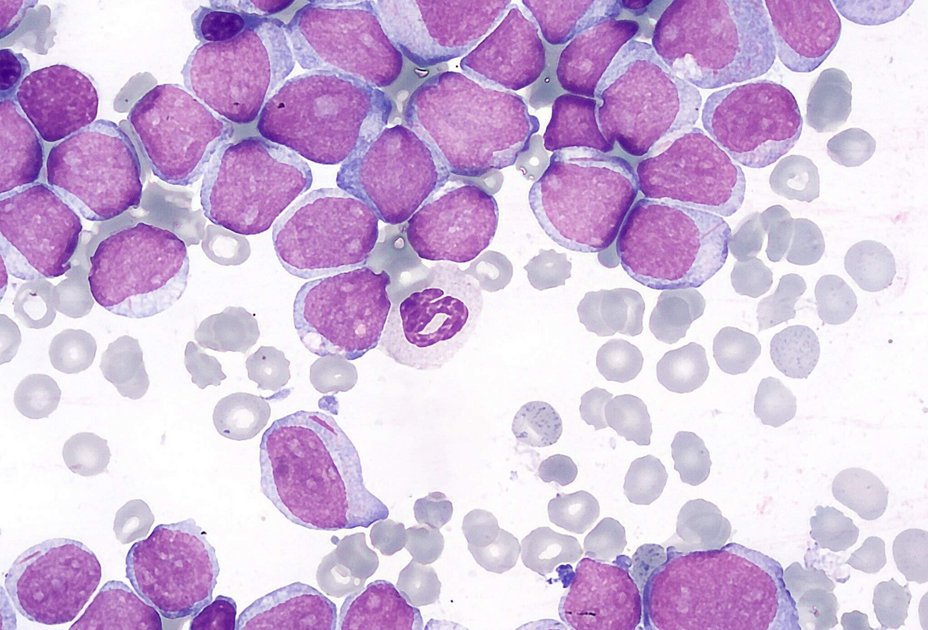- Home /
- University /
- Infoservice /
- Press Releases /
- Stop through SPOP: Vienna-based Researchers Develop Strategy Against Aggressive Blood Cancer
Research
Stop through SPOP: Vienna-based Researchers Develop Strategy Against Aggressive Blood Cancer
Acute myeloid leukemia (AML) with NUP98 fusions (NUP98-r) is an aggressive form of blood cancer. It is caused by a chromosomal rearrangement that abnormally fuses the NUP98 gene with other genes, resulting in the formation of NUP98 fusion oncoproteins. Until now, there have been no therapeutic strategies to directly inactivate NUP98 fusion oncoproteins. Researchers from the University of Veterinary Medicine Vienna, St. Anna Children's Cancer Research Institute, and the CeMM Research Center for Molecular Medicine have achieved a breakthrough: they identified the protein SPOP as a direct regulator of the stability of NUP98 fusion oncoproteins, providing a potential target for new therapies. The study was published in the prestigious scientific journal Cell Reports.

When blood cancer in children progresses particularly aggressively, it is often due to a genetic defect: a gene fusion, such as the NUP98 fusion oncoprotein, which drives uncontrolled cell growth. Standard therapies are often ineffective against this form of acute myeloid leukemia (AML). A promising therapeutic approach for this type of blood cancer is the targeted degradation of these cancer-causing fusion oncoproteins. However, the molecular mechanisms controlling the stability of NUP98 fusion oncoproteins were previously unknown.
Using the CRISPR/Cas9 gene-editing tool, the research team led by Florian Grebien, Professor of Medical Biochemistry at Vetmeduni and research group leader at the St. Anna Children's Cancer Research Institute, searched for genes that influence the stability of the cancer-causing NUP98 fusion protein. They discovered the protein SPOP (E3 ligase Speckle-Type POZ Protein) as a central regulator: it controls the stability of the NUP98 fusion protein and simultaneously acts as a natural tumor suppressor in NUP98-r AML. The findings reveal a novel approach to redirect the cell's natural degradation system – the so-called ubiquitin-proteasome system. This could enable the targeted degradation of pathogenic fusion proteins in the future.
"The loss of SPOP increases the levels of NUP98 fusion oncoproteins, thereby promoting the proliferation of leukemia cells. By exploiting this specificity, we demonstrated that inducing spatial proximity between SPOP and the NUP98 fusion oncoprotein resulted in the complete degradation of the fusion oncoprotein. This induced terminal differentiation and cell death in NUP98-r leukemia cells both in vitro and in vivo," explains the study's senior author, Florian Grebien.
SPOP as a Tumor Suppressor in NUP98-r Leukemia
SPOP has previously been associated with several human malignancies, where it can act either as a tumor suppressor or as a cancer-promoting factor, depending on the type of cancer. In their study, the researchers observed that both pharmacological inhibition and genetic disruption of SPOP led to increased levels of NUP98 fusion oncoproteins and enhanced proliferation of leukemia cells. "Consistent with its potential role as a regulator of NUP98 fusion oncoprotein stability, SPOP expression was consistently low in NUP98-r AML patients, suggesting a tumor-suppressive role for SPOP in NUP98-r leukemia," says the study's first author, Ecem Kirkiz from the Vetmeduni.
Foundation for New Therapies in NUP98-r AML
Since SPOP naturally binds well to NUP98 fusion proteins, the researchers took the next step by developing synthetic molecules called bioPROTACs. BioPROTACs are laboratory-designed biological molecules that specifically bring the two proteins together, triggering the degradation of the cancer-causing protein. The expression of an SPOP-bioPROTAC led to the efficient and complete degradation of the NUP98 fusion oncoprotein within 24 hours, promoted the terminal differentiation of leukemia cells, and induced an apoptotic response in cell cultures and in vivo.
"Our study identifies SPOP as a novel tumor suppressor in NUP98-r AML, pioneers the application of proximity-inducing agents for the degradation of oncogenic fusion proteins and lays the foundation for the development of therapeutically relevant PROTACs to combat NUP98 fusion oncoproteins and beyond," says Ecem Kirkiz, highlighting the milestone achieved in the research of NUP98-r leukemia.
The article „Harnessing the E3 ligase SPOP for targeted degradation of the NUP98::KDM5A fusion oncoprotein“ by Ecem Kirkiz, Gabriel Kaufmann, Simone Bergqvist, Pablo Fernández-Pernas, Thomas Eder, Laura Quell, Melanie Allram, Gabriele Manhart, Wencke Walter, Torsten Haferlach and Florian Grebien was published in „Cell Reports“ .
Scientific article
Scientific contact:
Univ.-Prof. Dr.rer.nat. Florian Grebien
Zentrum für Biologische Wissenschaften
Veterinärmedizinische Universiät Wien (Vetmeduni)
Florian.Grebien@vetmeduni.ac.at